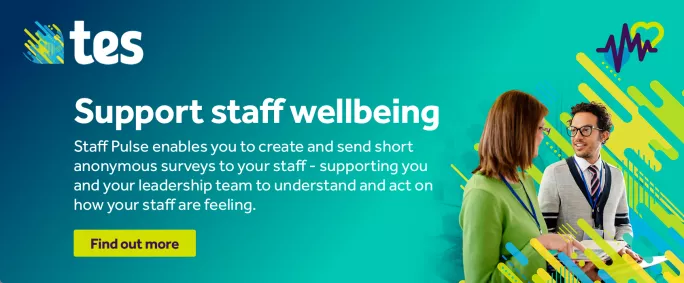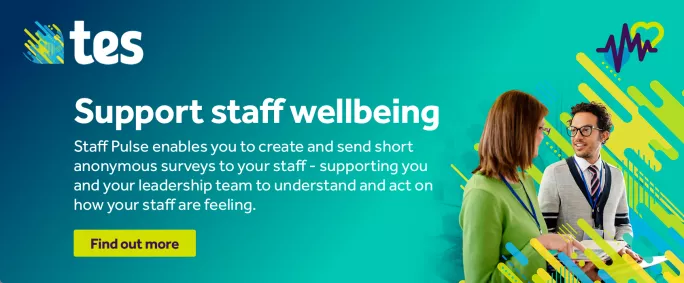
- Home
- 5 ways leaders can look after their wellbeing at Easter
5 ways leaders can look after their wellbeing at Easter

Dear Jo,
As a school leader, I’m used to adapting and coping with pressure, but this past month has been the longest of my teaching career. I’ve been so busy looking after the wellbeing of our students, staff and the community, not to mention that of my family, that I’ve completely neglected my own. What can I do to recharge?
Coronavirus: How school leaders can protect their wellbeing
Firstly, bravo. You’re playing a vital role, both on the front line and behind the scenes, in this most abnormal and challenging of situations.
Sometimes, as educators, it’s hard to know when you’ve really made a difference. At least now, I’d hope, it should be abundantly clear that you do. To the children and their families; to your staff and their children.
Of course, this isn’t without its cost. “Heavy is the head…,” after all.
Although that heaviness may continue, and this Easter “break” might be the “heaviest” on record, that doesn’t mean there aren’t things we can do to lighten the load; things that may even improve our ability to handle what’s still to come.
Perhaps, we can start by remembering that there’s a reason why, in an aeroplane safety briefing, we’re told “put your oxygen mask on first”. It’s because if you don’t, you’ll be of no use to anyone else.
Self-care isn’t a luxury, it’s more essential than ever. So what might this look like?
1. Take a break
Firstly, it’s vital - now more than ever - that you take time to switch off. Yes, there’s still planning to be done, details to be ironed out, even food parcels to be delivered… but among all of that you must, I repeat, take time to switch off. You can’t afford not to.
What that time actually looks like depends on you - though I will offer the following advice: when it comes to relaxation, experiment with what it means to you.
Don’t get suckered into the narrow version of time off that revolves around sugar, alcohol, Netflix marathons, online shopping and phone addiction. At least, not all of the time.
Relax as you wish. Just throw a little curiosity in there along the way; notice whether these comforts really do offer genuine good-feeling or simply the shadow of it, followed by a misery hangover.
Ask whether an activity energises or depletes you, if it’s genuine enjoyment or the numbing of emotion. Ask whether you’re making things easier for the “you” of tomorrow, or harder.
2. Get into some positive habits
Any positive habits you can create in the areas of sleep, diet and exercise (the foundation of physical, mental and emotional health) will serve you well, adding to your coping toolkit before everything picks up speed again.
The chances are that if you eat a wholesome, colourful diet, exercise for 30 minutes a day and practise enough sleep hygiene to get you nearer to eight hours, you’ll feel happier, but also stronger.
Speaking from personal experience, I’ve found that as much as I love falling into a glass (*bottle) of Prosecco after a stressful week, this momentary pleasure is rarely worth the week of increased anxiety that comes after.
On the other hand, 30 minutes peddling on the exercise bike sends my spirits soaring, with only positive after-effects. Likewise, an avocado/salmon binge never seems to bring about the same brain fog/depression that a doughnut frenzy does.
I’m not saying that this will be the case for you, only that a little self-observation may prove interesting.
3. Be mindful
Speaking of self-observation, I can’t think of a better time to begin or develop a daily mindfulness practice. There’s just so much out of our control right now, so much uncertainty, so much conflicting information, so much to do. It’s only natural that our focus would be pulled towards anxieties surrounding the near and distant future.
That’s where mindfulness comes in, allowing you a little more space to breathe, to step back from thoughts and feelings, to reduce the intensity of any discomfort you’re feeling. It allows you to build a barrier between yourself and whatever “stress” you may be dealing with.
If you’re unsure where to start and too busy to learn, I recommend downloading the Smiling Mind app… because it’s free and fabulous.
You can follow a structured programme of meditation in a range of areas, including Thrive Inside: a programme aimed at supporting you throughout this global crisis.
Plus, there’s a whole series of meditations based on helping you to sleep - great if your mind is keeping you awake at night.
Mindfulness helps you to notice where your attention is focused and to redirect if needed. This is especially challenging right now, with the news being as disagreeable yet gripping as it is, with much that pertains directly to schools.
4. Have a digital detox
Do yourself a favour and limit your intake of information; stay informed, without living on a diet of stress, worry, sadness or frustration.
Check your emails at three points in the day - not continuously throughout the day - and limit your news intake in the same way. I’d also recommend charging your phone away from the bed and avoid looking at this in the first and last hour of the day (when it’s especially key to protect yourself from stress.)
Better still, start your morning by writing down three things that you’re grateful for and finish by noting three positives of the day.
This will train your mind to notice the positive a little more…something that we’re desperately in need of right now.
5. Reach out
Lastly, make time to talk to like-minded professionals who are “in the same boat”. To colleagues and employees, on a personal level as well as professional. To friends, family and those who you can be truly vulnerable with. To people who have naff all to do with teaching.
Difficult as it may be, don’t lose sight of the fact that you’re more than a job role - you’re a person, too. Treat yourself as such.
Jo Steer is a former leader now working with schools as a wellbeing consultant
Register with Tes and you can read five free articles every month, plus you'll have access to our range of award-winning newsletters.
Keep reading for just £4.90 per month
You've reached your limit of free articles this month. Subscribe for £4.90 per month for three months and get:
- Unlimited access to all Tes magazine content
- Exclusive subscriber-only stories
- Award-winning email newsletters
You've reached your limit of free articles this month. Subscribe for £4.90 per month for three months and get:
- Unlimited access to all Tes magazine content
- Exclusive subscriber-only stories
- Award-winning email newsletters





